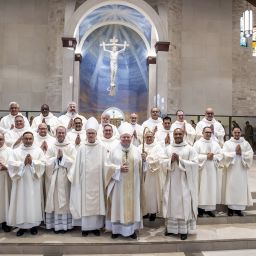By Father Thomas Esposito, O. Cist.
Special to The Texas Catholic
This petition is the most scandalous of them all.
The verb tenses reveal the heart of the matter. A literal translation of Matthew’s version reads, “Forgive us our debts just as we have (already) forgiven those indebted to us” (Mt 6:12). The aorist (or past) tense implies a completed action of forgiveness on our part, implicitly prior to God’s forgiveness of our debts. Luke’s version applies the same tension with a slight nuance: “Forgive us our sins, since we ourselves forgive everyone indebted to us” (Lk 11:4). The present tense suggests that forgiveness is our standard mode of operating.
It seems that Jesus is telling us to tell God the Father to do what we do. Is that not crazy?
Surely something is askew here; this logic verges on a quid pro quo deal with the Divine! Yet, Jesus confirms this brazen approach just after presenting the Our Father prayer: “If you forgive others their transgressions, your heavenly Father will forgive you; but if you do not forgive others, neither will your Father forgive your transgressions” (Mt 6:14-15).
If we accept the premise of this crazy logic, we must conclude that God permits us to be our own judges, or the overseers of a covenant, whose terms we set. He then binds himself to the measure of justice that we set for others: “The measure with which you measure will be measured out to you” (Mt 7:2; Lk 6:38). God effectively says to each of us, “Thy will be done…on earth as it is in heaven.”
This is a terrifying prospect, because anyone who has held tightly a burden of anger, a debt of shame, whenever they have sinned against someone else, and especially when someone has sinned against them, knows how laced with unforgiving hatred our spiritual blood can be. The ability to forgive feels so elusive, even impossible; I am well aware of the herculean labors required to entrust a debt, a scar, a sin-ensnared nightmare to the Lord. But we must take Jesus at his mysterious word.
How terrifying to be summoned to measure out the length of forgiveness that will be measured out to us! But Christ does not want to create despair in us when we pray this petition. The challenge that Jesus sets for us is to bind ourselves to his standard of mercy, rather than to our wound-preserving selfishness. He reminds us, subtly but insistently, of a glorious truth: Whether we like it or not, we are delegated a divine power, to be used extravagantly, from the One “who alone can forgive sins” (Mk 2:7; Lk 5:21)! It is a power that, when we accept our capacity to use it, equips us to imitate Christ, who forgives all who “know not what they do” (Lk 23:34).
Jesus summons us to a far nobler way of thinking and living than the vindictive and misery-preferring instincts that normally govern our memories and actions. Just as Christ offers himself on the cross as a living sacrifice to authenticate his words of forgiveness, so too are we summoned to image his mercy, no matter how imperfect our sacred effort might be. St. Gregory of Nyssa understands the petition in this light: “When, therefore, we are about to offer to God the petition for mercy and forgiveness, we ought to give holy confidence to our conscience by putting forward our life as an advocate of our words, so that we can truly say, ‘as we forgive our debtors.’”
Jesus indeed wants us to tell God the Father to forgive us as we forgive others. He also shows us, gently, by his compassionate arms outstretched on the cross, how to forgive ourselves and those who have trespassed against us. The telltale effect of that double forgiveness, our own of others and God’s of us, is the peaceful freedom enjoyed by the children of God.
Father Thomas Esposito, O.Cist., is a monk at the Cistercian Abbey of Our Lady of Dallas and teaches in the theology department at the University of Dallas.
Cutline for featured image: Congregants are pictured in a file photo praying for peace during Mass at All Saints Church in Milwaukee. (OSV News photo/Juan C. Medina, Catholic Herald)















